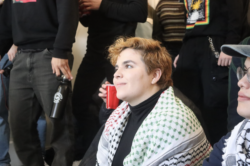Georgetown’s Arabic Department will offer a class in the Iraqi dialect of Arabic during the three-week pre-session before summer classes next year. Professors are currently developing a course after receiving $180,000 in grant money from a U.S. Department of Education to the National Capital Language Resource Center.
Georgetown, along with The George Washington University and the Center for Applied Linguistics, is part of the NCLRC, which is a federally-funded language resource center that focuses on linguistics and lesser-known languages.
Arabic has both a spoken and a written form. Native Arabic speakers use not only a regional spoken dialect but also the more formal Modern Standard Arabic, the language of reading and writing.
Most students who study Arabic at Georgetown learn to read and write MSA, although classes in the Egyptian dialect and Formal Spoken Arabic are occasionally offered, according to Professor Margaret Nydell, who is developing the dialect program.
The Arabic program’s expansion could shift some of the focus from the written language to the spoken language. If the Iraqi dialect conversion course is successful, other dialects may be offered during the school year, according to Professor Karin Ryding, chair of the Arabic Language, Literature and Linguistics Department.
These classes are conversion courses, stressed Ryding, and will be offered to students who have taken MSA for at least two years. Students will use their knowledge of the written language to acquire speaking and listening skills in a dialect.
Professor Nydell explained the transition from MSA to learning a dialect.
“It’s like going from Latin to Spanish or French,” she said.
The three-week conversion course will not result in students’ ability to speak Iraqi Arabic, Nydell said, but will allow them to comprehend the Iraqi dialect using MSA knowledge.
Arabic students are pleased with the expansion of the program to include more dialects.
The department should continue to expand into dialect as long as they have the opportunity, said Arabic speaker Omar Wahab (SFS ‘05).
Wahab cited Egyptian, Lebanese and Iraqi dialects as the most important dialects for students to learn.
David Waytz (SFS ‘05), a second-year Arabic student, said that he and other students would be interested in taking a course in a regional dialect.
Learning MSA does not help a student understand what people are saying on the street in the Arab-speaking world, where people speak in dialect, Waytz said.
Iraqi is an important dialect, and not a surprising choice for the department to expand into, Waytz said.
“It’s especially appropriate with the situation in Iraq and the war on terrorism … A lot more people are taking Arabic,” he said.




